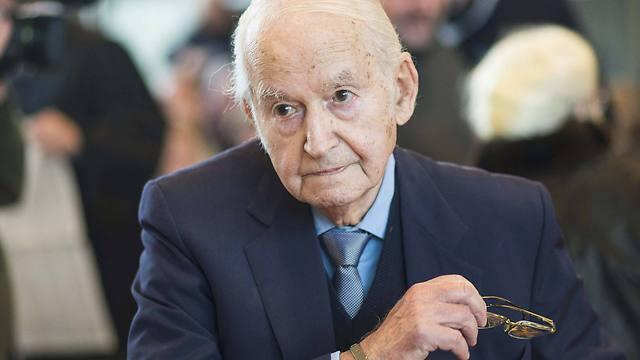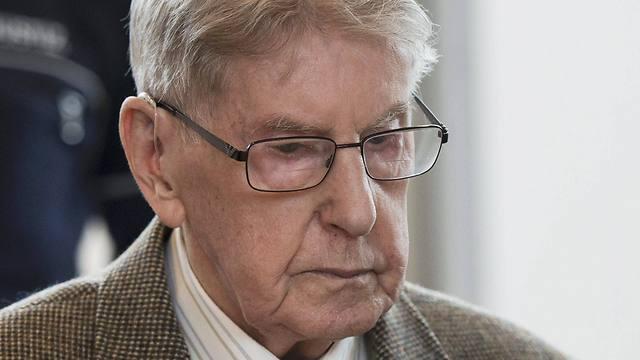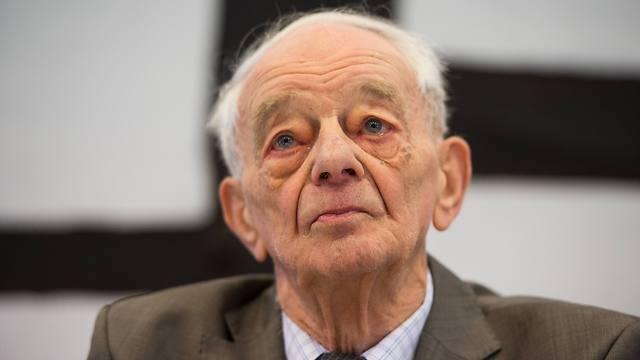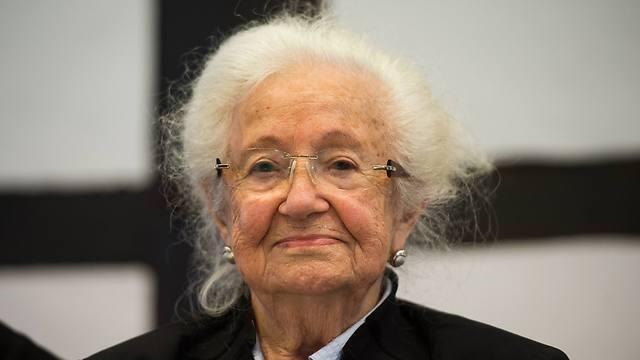A 94-year-old former SS guard at the Auschwitz death camp went on trial this week on 170,000 counts of accessory to murder, the first of up to four cases being brought to court this year in an 11th-hour push by German prosecutors to punish Nazi war crimes.
Three Holocaust survivors took the stand on Friday to testify about the horrors they experienced at Nazi Germany's Auschwitz death camp.
Former SS sergeant Reinhold Hanning sat only a few meters from the witnesses, but showed no emotion as they told of crematoria chimneys belching flames, naked prisoners being taken to the gas chambers, and seeing people being shot.
Accused by the prosecutor's office in Dortmund as well as by 40 joint plaintiffs from Hungary, Israel, Canada, Britain, the United States and Germany, Hanning is said to have joined the SS forces voluntarily at the age of 18 in 1940. He joined Auschwitz as a guard two years later.
Although Henning wasn't directly involved in any killings at the camp, prosecutors accuse him of expediting, or at least facilitating, the slaughter in his capacity as a guard at the camp where 1.1 million people, most of them Jews, were killed.
Cross-examining the three witnesses, prosecutor Andreas Brendel tried to determine direct knowledge of the guard's duties in Auschwitz but none of them knew Hanning personally.
Justin Sonder, the youngest of the witnesses at 90, arrived at Auschwitz at age 17 and was selected to be a slave laborer for the IG Farben company, rather than sent directly to the gas chambers.
He told the court that after three or four months, he was considered one of the "older" prisoners and feared most selection days, when SS men would look at rows of inmates, who were forced to stand in a line naked for up to four hours, and decide who was still fit to work and who should be killed.
"I don't have the words to describe how it was, when you know that you could be dead in one or two hours, it made you sick, made you crazy," he said, his voice trembling with emotion.
"I survived 17 selections," added Sonder, a retired police officer from Chemnitz, who lost 22 family members in the Holocaust.
Hanning is accused of serving as an SS Unterscharfuehrer (junior squad leader) in Auschwitz from January 1943 to June 1944, a time when hundreds of thousands of Hungarian Jews were brought to the camp in cattle cars and gassed to death.
The trial for the retiree from a town near the western city of Detmold is one of the latest that follow a precedent set in 2011, when former Ohio autoworker John Demjanjuk became the first person to be convicted in Germany solely for serving as a camp guard, with no evidence of involvement in a specific killing.
The verdict vastly widened the number of possible prosecutions, establishing that simply helping the camp to function was sufficient to make one an accessory to the murders committed there. Before that, prosecutors needed to present evidence of a specific crime - a difficult task with few surviving witnesses and perpetrators whose names were rarely known and whose faces were often only seen briefly.
Hanning, a retired dairy operator, admitted to investigators when first questioned that he had served in the Auschwitz I part of the camp in Nazi-occupied Poland, but denied serving at the Auschwitz II-Birkenau section, where most of the 1.1 million victims were killed.
Prosecutor Andreas Brendel told The Associated Press, however, that guards in the main camp were also used as on-call guards to augment those in Birkenau when trainloads of Jews were brought in.
"We believe that these auxiliaries were used in particular during the so-called Hungarian action in support of Birkenau," he said.
Trial sessions are limited in deference to Hanning's health and a doctor is on hand throughout, but he seems in good condition for his age, walking in and out of the court without the help of a cane and listening attentively throughout.
He has spoken only one word so far, however, telling presiding judge Anke Grudda on Friday when she asked how he was after the first day of trial that he was "good."
His attorney, Andreas Scharmer told The Associated Press that it was "highly likely" that his client would make a statement during the proceedings, but he would not say how detailed it might be nor when.
Sonder said he looked forward to hearing what Hanning had to say.
"Perhaps he will try to explain - it would be good if he did," Sonder told the AP after the session. "I hope he finds the courage to say something."
Survivor Erna de Vries, whose father was not Jewish, told the court when the Nazis came for her Jewish mother in 1943 she did not have to go with her to Auschwitz but chose to stay with her.
She was in Auschwitz for only two months when the SS took her and about 85 other half-Jews to the women's concentration camp Ravensbrueck.
"That was one of the worst days of my life when I was sent to Ravensbrueck and my mother stayed in Auschwitz," she said. "I never saw her again."
She said that her mother had been happy to hear that she was going to Ravensbrueck, knowing that any place was better than Auschwitz.
"Auschwitz was a death camp, and she had the hope it would get better for me," she said.
De Vries also described how she had to walk past piles of dead bodies each day on her way to forced labor in 1942, as the Nazis couldn't keep up with burning the bodies of people gased to death.
Leon Schwarzbaum, a 94-year-old Auschwitz survivor from Berlin who was used as slave laborer to help build a factory for Siemens outside the camp, said he could not see the area with the gas chambers and crematoria from where he was kept, but that everyone knew exactly what was going on there.
"We saw the fire from the chimneys," he told the court. "So much fire came out of the chimneys, no smoke, just fire. And that was burning people."
5 View gallery


Auschwitz concentration camp survivor Leon Schwarzbaum presents an old photograph showing himself, left, next to his uncle and parents who all died in Auschwitz (Photo: AP)
(צילום: AP)
"If your ribs were visible, you were a candidate for the crematorium," added Schwarzbaum, who lost 35 family members during the Holocaust.
The three are among about 40 survivors and their families who have joined the trial as co-plaintiffs, as allowed under German law. Not all will testify, but the trial is scheduled to hear three more when testimony resumes next Thursday, and two more on Friday.
Hanning's case is one of some 30 involving former Auschwitz guards investigated by federal prosecutors from Germany's special Nazi war crimes office in Ludwigsburg. It was sent to state prosecutors in 2013 with the recommendation that they pursue charges after the office undertook a major review of its files following the Demjanjuk verdict.
5 View gallery


Holocaust survivor and former prisoner at Auschwitz death camp Leon Schwarzbaum (Photo: Reuters)
(צילום: רויטרס)
Although Demjanjuk always denied serving at the death camp and died before his appeal could be heard, prosecutors last year managed to use the same legal reasoning to successfully convict SS Unterscharfuehrer Oskar Groening ,who served in Auschwitz, on 300,000 counts of accessory to murder.
Groening's appeal is expected to be heard sometime this year, but prosecutors are not waiting to move ahead with other cases.
Hubert Zafke, 95, a former SS Oberscharfuehrer - roughly equivalent to a Sgt. 1st Class - is scheduled to go on trial at the end of February in Neubrandenburg, north of Berlin, on 3,681 counts of accessory to murder on accusations he served as a medic at an SS hospital in Auschwitz in 1944.
His attorney, Peter-Michael Diestel, says it is Germany's "shame" that many higher-ranking Auschwitz perpetrators and other Nazi war criminals were able to escape with minimal or no sentences in the initial years after the war, and questions whether prosecutors are trying "to make up for mistakes of the past" with his client.
"He was a medic for Wehrmacht (army) soldiers and SS men - for uniformed men - and had no part of the Holocaust, but the judicial argument of the Demjanjuk verdict says that if he didn't provide his service as a medic then Auschwitz wouldn't have functioned," Diestel said. "What should a young man, even if he knew what was going on in Auschwitz, do to stop it?"
There is no question there were "some serious failures by the German judicial system in the past," says Efraim Zuroff, the head Nazi-hunter at the Simon Wiesenthal Center. But "that doesn't in any way change the validity of what's happening now."
"In a certain sense, you could say these people had the bad luck to live a long life," he told the AP in a telephone interview from Jerusalem. "If they had died five years ago they would never have been going to trial."
Two others whose cases are likely to go to trial this year are a 93-year-old woman charged with 260,000 counts of accessory to murder on allegations she served as a radio operator for Auschwitz's commandant in 1944, and a 94-year-old man charged with 1,276 counts on allegations he served as an Auschwitz guard.
In all four cases, the health of the elderly defendants will be a major factor in whether the trials can be concluded.
Still, Jens Rommel, the head of the Nazi war crimes investigative office in Ludwigsburg, says it is too early to talk of the last round of trials. There are a half-dozen open investigations right now with state prosecutors, and his office is looking into another seven suspects from both the Auschwitz and the Majdanek death camps.
"Year by year it's more difficult, but the state justice ministers last year decided that Ludwigsburg would keep working," he says. "The state of North-Rhine Westphalia last summer talked about another 10 years as a timeframe."
Reuters contributed to this report.




